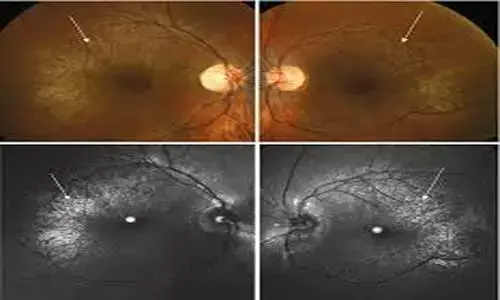- Home
- Medical news & Guidelines
- Anesthesiology
- Cardiology and CTVS
- Critical Care
- Dentistry
- Dermatology
- Diabetes and Endocrinology
- ENT
- Gastroenterology
- Medicine
- Nephrology
- Neurology
- Obstretics-Gynaecology
- Oncology
- Ophthalmology
- Orthopaedics
- Pediatrics-Neonatology
- Psychiatry
- Pulmonology
- Radiology
- Surgery
- Urology
- Laboratory Medicine
- Diet
- Nursing
- Paramedical
- Physiotherapy
- Health news
- Fact Check
- Bone Health Fact Check
- Brain Health Fact Check
- Cancer Related Fact Check
- Child Care Fact Check
- Dental and oral health fact check
- Diabetes and metabolic health fact check
- Diet and Nutrition Fact Check
- Eye and ENT Care Fact Check
- Fitness fact check
- Gut health fact check
- Heart health fact check
- Kidney health fact check
- Medical education fact check
- Men's health fact check
- Respiratory fact check
- Skin and hair care fact check
- Vaccine and Immunization fact check
- Women's health fact check
- AYUSH
- State News
- Andaman and Nicobar Islands
- Andhra Pradesh
- Arunachal Pradesh
- Assam
- Bihar
- Chandigarh
- Chattisgarh
- Dadra and Nagar Haveli
- Daman and Diu
- Delhi
- Goa
- Gujarat
- Haryana
- Himachal Pradesh
- Jammu & Kashmir
- Jharkhand
- Karnataka
- Kerala
- Ladakh
- Lakshadweep
- Madhya Pradesh
- Maharashtra
- Manipur
- Meghalaya
- Mizoram
- Nagaland
- Odisha
- Puducherry
- Punjab
- Rajasthan
- Sikkim
- Tamil Nadu
- Telangana
- Tripura
- Uttar Pradesh
- Uttrakhand
- West Bengal
- Medical Education
- Industry
Retinal imaging may predict cognitive dysfunction risk in diabetics, Finds study

Researchers from the Research Division, Joslin Diabetes Center, Boston, Massachusetts, USA have found out that noninvasive retinal imaging using OCT and OCTA may assist in estimating the risks for cognitive dysfunction in people with type 1 diabetes, as published in the Journal of Clinical Endocrinology and Metabolism.
Cognitive dysfunction is a growing and understudied public health issue in the aging type 1 diabetic population and is difficult and time-consuming to diagnose. Studies in long-duration type 1 diabetes have reported the presence of proliferative diabetic retinopathy was associated with cognitive dysfunction.
Hence, Ward Fickweiler and associates conducted this study to assess whether structural and vascular abnormalities of the retina, representing an extension of the central nervous system is associated with cognitive impairment and other complications of type 1 diabetes.
The authors carried out an observational cross-sectional study of individuals with 50 or more years of type 1 diabetes at a university hospital in the United States. The study included 129 participants with complete cognitive testing. Validated cognitive testing measures included psychomotor speed, and immediate, and delayed memory. Optical coherence tomography (OCT) and OCT angiography (OCTA) were performed to obtain neural retinal layer thicknesses and vascular density for superficial (SCP) and deep retinal capillary plexus (DCP). Multivariable modeling was adjusted for potential confounders associated with outcomes in unadjusted analyses.
The results were-
a. Decreased vessel density of the SCP and DCP was associated with worse delayed memory (DCP: P = .002) and dominant hand psychomotor speed (SCP: P = .01).
b. Thinning of the retinal outer nuclear layer was associated with worse psychomotor speed both in non-dominant and dominant hands (P = .01 and P = .05, respectively).
c. Outer plexiform layer thickness was associated with delayed memory.
Hence, these findings suggested that noninvasive retinal imaging using OCT and OCTA may assist in estimating the risks for cognitive dysfunction in people with type 1 diabetes, the authors concluded.
Dr. Nandita Mohan is a practicing pediatric dentist with more than 5 years of clinical work experience. Along with this, she is equally interested in keeping herself up to date about the latest developments in the field of medicine and dentistry which is the driving force for her to be in association with Medical Dialogues. She also has her name attached with many publications; both national and international. She has pursued her BDS from Rajiv Gandhi University of Health Sciences, Bangalore and later went to enter her dream specialty (MDS) in the Department of Pedodontics and Preventive Dentistry from Pt. B.D. Sharma University of Health Sciences. Through all the years of experience, her core interest in learning something new has never stopped. She can be contacted at editorial@medicaldialogues.in. Contact no. 011-43720751
Dr Kamal Kant Kohli-MBBS, DTCD- a chest specialist with more than 30 years of practice and a flair for writing clinical articles, Dr Kamal Kant Kohli joined Medical Dialogues as a Chief Editor of Medical News. Besides writing articles, as an editor, he proofreads and verifies all the medical content published on Medical Dialogues including those coming from journals, studies,medical conferences,guidelines etc. Email: drkohli@medicaldialogues.in. Contact no. 011-43720751


